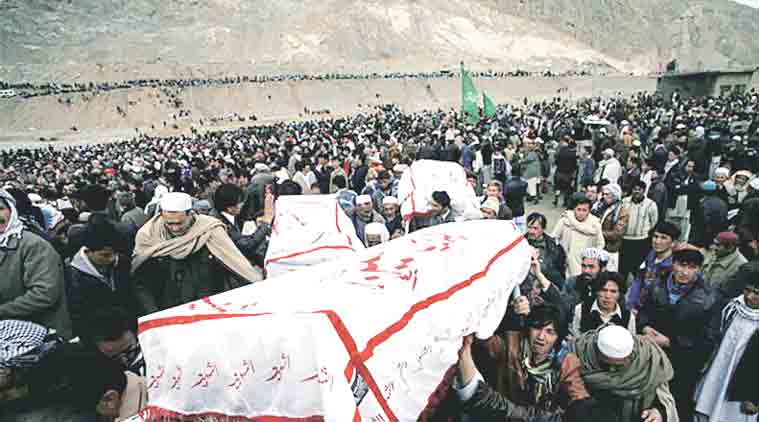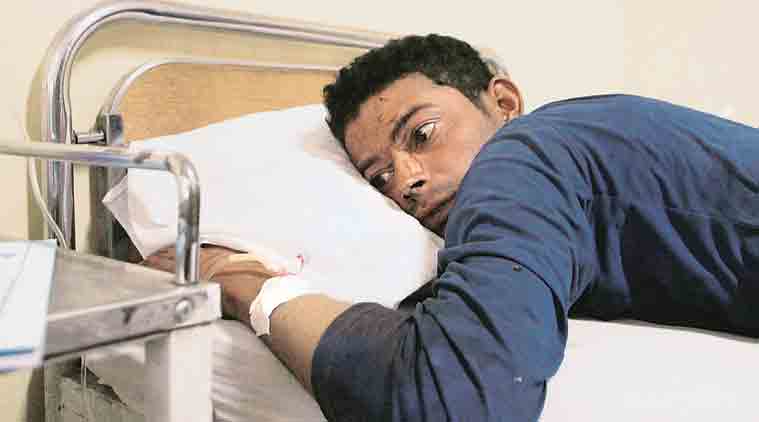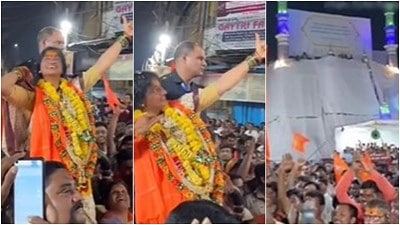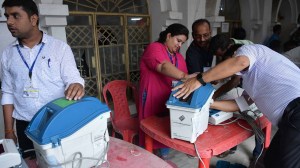- India
- International
How Lashkar-e-Jhangvi’s anti-Shia crusade became a war on Pak state
Quetta attack shows killing of the group’s top leaders last year was just a punctuation in its bloody history.
 The history of the Lashkar-e-Jhangvi is one of hatred for the Shi’a, which has seen it carry out a series of deadly attacks (such as in Quetta, 2013 (Source: Reuters)
The history of the Lashkar-e-Jhangvi is one of hatred for the Shi’a, which has seen it carry out a series of deadly attacks (such as in Quetta, 2013 (Source: Reuters)
Everyone watched as it happened, some cheering, others silent. The mob, spearheaded by some 50 men with weapons, dragged the three women out of their home, tore off their clothes, shaved their hair, and blacked their faces. The women were then marched naked to the local police station, with officers providing an escort. Intizar-ul-Haq Muaviah, the politician who led the mob, said the women were prostitutes; and the Shia community, to which they belonged, was polluting the country. He was not punished for the crime; it was a small one compared to the others he had committed as a member of an anti-Shia militia.
Watch what else is making news:
Few any longer remember the story of Shahnaz Bibi, the woman marched through the streets of Phool Nagar, near Lahore, on September 29, 2009: one outrage displaced another, while the legal process dragged on.
The story, though, is key to understanding the real significance of Monday night’s terrorist attack on police cadets in Quetta, which left at least 61 dead and over 100 injured. The perpetrators were the military vanguard of the mob in Phool Nagar, fighting to remake Pakistan in their image of an Islamic state. From a campaign against an infidel sect, their war has morphed into one against an ‘apostate’ state.
***
 The attack on police cadets on Monday demonstrates that the Sunni extremist group’s campaign against an ‘infidel’ sect has now morphed into a war against what it sees as an ‘apostate’ state. (Source: Reuters)
The attack on police cadets on Monday demonstrates that the Sunni extremist group’s campaign against an ‘infidel’ sect has now morphed into a war against what it sees as an ‘apostate’ state. (Source: Reuters)
Intercepted phone calls, the Inspector-General of the army-officered Frontier Corps in Balochistan said on Tuesday, link the Quetta attackers to the Lashkar-e-Jhangvi’s Al-Alami faction — one of several anti-Shia groups responsible for hundreds of killings directed both at the religious minority and the state. The Islamic State, though, has claimed responsibility for the killings, too, releasing photographs of men it says were the three attackers who carried out the attack.
Though the apparent contradiction has left many confused, the two claims aren’t really contradictory at all: the Islamic State in South Asia is more a flag than an organisation, flown by a disparate coalition of jihadist organisations brought together by shared ideology and circumstance.
***

In 1984, an obscure cleric called Maulana Haq Nawaz Jhangvi founded the Anjuman-e-Sipah-e-Sahaba Pakistan in the Punjab town of Jhang. Fired by General Zia-ul-Haq’s Islamising project, he saw his organisation as the vanguard of Sunni orthodoxy against Iranian radicalism, and a force that would help in the transformation of Pakistan into a militarist theological state. Maulana Jhangvi was among a new generation of Pakistani clerics who emerged around the time, graduating from seminaries that owed their thinking to the Deobandi tradition, and their politics to the ultra-right Jamiat-e-Ulama-e-Islam.
For years, the Sipah-e-Sahaba, as it called itself after dropping the word Anjuman from its name in 1985, did little other than lobby the state and Saudi Arabia for money. Its cadre plastered walls in Jhang with graffiti: “Kaffir, kaffir — Shia kaffir” was one particularly unimaginative slogan.
In December 1990, though, the SSP assassinated Iranian diplomat Sadiq Ganji, laying the foundations for what would prove to be a long and murderous campaign. Maulana Alam Tariq, Riaz Basra, Akram Lahori and Malik Ishaq would become key players in the jihadist landscape — and in Punjab’s politics.
***
Like other Deobandi groups, the Sipah-e-Sahaba suckled on the udders of the Harkat-ul-Jihad-e-Islami, the largest of the Deobandi jihadist groups set up to fight against the Soviet Union in Afghanistan. The Sipah-e-Sahaba’s cadre trained at its camps, and shared the same world view, with one key difference — where other groups in the 1990s turned outwards, to fight in Kashmir, its war was focussed on the enemies of Islam within.
In the years that followed, the various constituent factions splintered, splintered again, and re-formed. The Lashkar-e-Jhangvi was set up in 1996, for example, after rebels believed the leadership had lost sight of the Sipah-e-Sahaba’s true objectives, and become mired in politics. Lashkar-e-Jhangvi Al-Alami was a branch of this new group, responsible for operations of international significance.
Following General Pervez Musharraf’s rise to power, the Inter-Services Intelligence Directorate helped engineer Sipah-e-Sahaba chief Maulana Azam Tariq’s election to the National Assembly, seeing him as a counterweight both to democrats and jihadists. He repaid the favour by voting for the military ruler’s proxy Prime Minister, Mir Zafarullah Jamali, who won by one vote.
But in the years after the India-Pakistan military crisis of 2001-2002, General Musharraf’s regime began choking jihadist groups in Pakistan. Riaz Basra, the Lashkar-e-Jhangvi’s chief, was killed. The Sipah-e-Sahaba turned to now-Prime Minister Nawaz Sharif’s Pakistan Muslim League-Nawaz for help. The PML (N)’s Rana Sanaullah and Sardar Zulfiqar Khan gave supporters of the Sipah-e-Sahaba a home inside the party, in return for the use of its networks against the Pakistan People’s Party and the army.
***
After the 2008 general elections in Punjab, analyst Mujahid Husain has written, several PML(N) candidates “indirectly accepted the fact that their electoral victory was not possible without the help of sectarian and extremist religious outfits”. It was these forces that created the climate for events like that in Phool Nagar — and a series of gruesome terrorist massacres of the Shia that came to dot Pakistan’s history.
The deal saw the Lashkar-e-Jhangvi, still closely allied with the Sipah-e-Sahaba, wield unprecedented power. In a 2011 pamphlet, it proclaimed “All Shias are worthy of killing. We will rid Pakistan of [these] unclean people. Pakistan means land of the pure, and the Shias have no right to be here.” Malik Ishaq, the chief of the Lashkar-e-Jhangvi, toured the country giving inflammatory sermons, and was alleged to have ordered the January 10, 2013 attack on a snooker hall frequented by young ethnic Hazaras that killed 92.
Last year, though, the state finally hit back, fearing the jihadists were drifting irrevocably into the Islamic State’s arms. Intelligence services warned that meetings had been held between Lashkar-e-Jhangvi leaders and top Islamic State functionaries, at which plans were made that would threaten the Pakistani military itself.
Ishaq and his two sons, Usman and Haq Nawaz, were taken into custody — and days later, all three, and eleven other cadre, were killed in a mysterious police encounter.
Elements of the Lashkar-e-Jhangvi responded by retreating into the protective embrace of pro-Islamic State jihadists inside Pakistan, like Jundullah and factions of the Tehreek-e-Taliban. Little is known of who leads these new networks, but attacks like that on Monday have demonstrated beyond doubt their lethality.
Farhan Zaidi and Muhammad Ismail Khan, who analysed these new networks in a recent essay, noted that although the Islamic State “may find it hard to extend its control to Pakistan, it may be able to cobble together enough adherents — fighters and polemicists — to cause turmoil in Pakistan for years to come”.
The killing of its top leaders last year, it would seem, was just a punctuation in the Lashkar-e-Jhangvi’s story.
More Explained
EXPRESS OPINION
Apr 19: Latest News
- 01
- 02
- 03
- 04
- 05








































